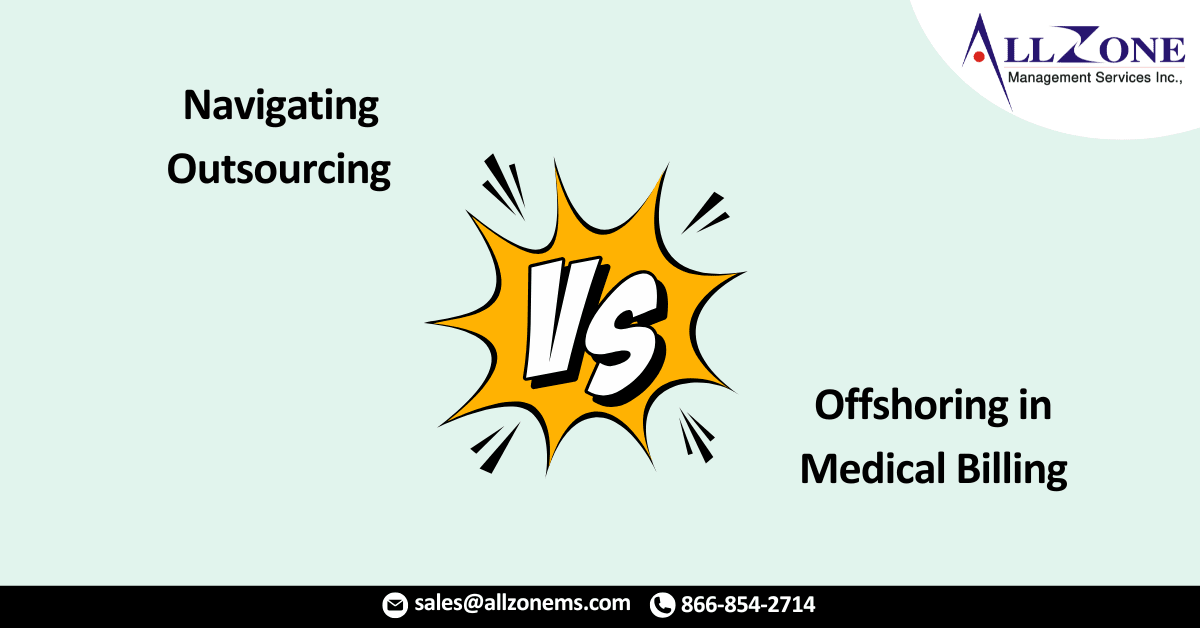Outsourcing Vs Offshoring in Medical Billing: Targeting Cost Savings with a Global Reach:
Both medical billing outsourcing and offshoring involve delegating billing tasks to another entity, but there’s a key difference in their destination:
- Medical Billing Outsourcing: In general outsourcing, the Medical Billing company can be located anywhere. It could be in the same state, a different state within the US, or even another country. You’re contracting a third-party company to handle your billing, regardless of their location.
- Medical Billing Offshoring: This is a specific type of outsourcing where the billing company is located in a different country, often to take advantage of lower labor costs. Common destinations for offshoring medical billing include India, the Philippines, and Eastern Europe.
In essence, offshoring is a type of outsourcing restricted to a different country. You might choose outsourcing for various reasons besides location, such as seeking specialized expertise the company possesses. But when cost reduction is a prime motivator, and you’re comfortable with potential drawbacks like time zone differences and communication challenges, then offshoring becomes a viable option within medical billing outsourcing.
Should You Outsource Your Medical Billing?
Here’s a breakdown of the pros and cons to help you decide.
Consider outsourcing if:
- Your billing is inefficient: Frequent claim rejections and slow payments might signal problems. Outsourcing can improve accuracy and speed up collections.
- Staff turnover is high: In a small practice, this can be disruptive. Outsourcing ensures consistent billing expertise.
- Tech headaches are a burden: Managing billing software and training staff can be time-consuming. Outsourcing lets you focus on other areas.
- You’re a new practice: Launching a practice is overwhelming. Outsourcing billing frees you to focus on patient care.
- You prioritize patient care: Solo physicians may not have the time or interest in billing tasks. Outsourcing allows them to concentrate on patients.
Outsourcing Vs Offshoring in Medical Billing:
Things to consider before outsourcing:
- Efficiency is key: Clean up your internal billing processes before outsourcing. “Garbage in, garbage out” applies to billing too.
- Research the provider: Ensure they have certified coders specializing in your area for accurate claims.
- Communication is crucial: Assign a point person to handle communication with the billing company. This will ensure smooth operations and revenue collection.
- Offshore operations are common: Many outsourcing medical billing companies use offshore teams. This shouldn’t be a deal-breaker, as insurance companies often do the same.
Ultimately, the decision to outsource comes down to your specific needs and preferences.
Things to Consider Before Offshoring
Offshoring, or moving business operations to a different country, can be a tempting strategy to cut costs and expand your reach. But before you dive in, it’s crucial to carefully consider the potential challenges and ensure it’s the right fit for your company. Here are some key factors to weigh:
1. Explore All Options: Offshoring isn’t the only way to streamline your business. Consider automating tasks, nearsourcing (outsourcing to a closer location), or improving internal efficiency before making a big leap.
2. Risk Assessment: Offshoring comes with inherent risks. Evaluate factors like political instability, intellectual property protection, and currency fluctuations in the potential offshore location.
3. What to Offshore? Not all functions are created equal. Identify tasks that are well-defined, require minimal supervision, and don’t rely heavily on cultural nuances before deciding to offshore them.
4. Administrative Hurdles: Be prepared for additional administrative burdens associated with managing an offshore workforce, such as time zone differences, communication challenges, and cultural barriers.
5. Choosing the Right Partner: If you decide to offshore, do your research! Select a reputable vendor with a proven track record, strong industry expertise, and a good understanding of your specific needs.

